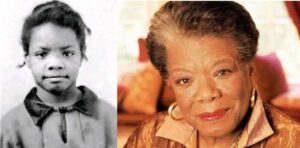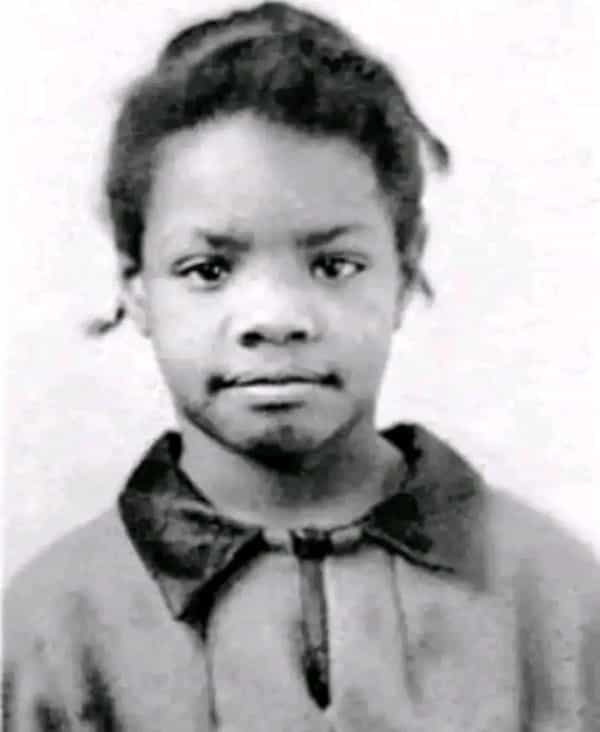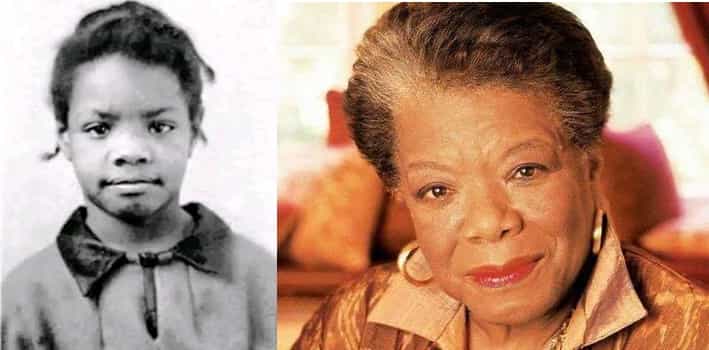Maya Angelou: The Phenomenal Woman Who Gave Voice to a Generation

Maya Angelou stands as one of the most influential figures of the 20th century—a poet, memoirist, civil rights activist, and artist whose words and life continue to inspire millions around the globe.
With a career spanning over six decades, Angelou’s powerful storytelling, insightful poetry, and advocacy for social justice have made her a cultural icon. Her works delve into themes of identity, trauma, empowerment, and the Black experience, shaping American literature and human rights discourse.
Overcoming a Tumultuous Beginning
Maya Angelou was born Marguerite Ann Johnson on April 4, 1928, in St. Louis, Missouri. Her early years were marked by hardship. After her parents’ divorce, Angelou and her brother, Bailey, were sent to live with their grandmother in Stamps, Arkansas. Life in the segregated South exposed young Angelou to the harsh realities of racism and discrimination, experiences that would later inform much of her writing.

At the age of seven, Angelou endured a traumatic event when she was sexually assaulted by her mother’s boyfriend. After revealing the abuse, the man was killed—an event that led Angelou to believe that her words had caused his death. This belief pushed her into silence, and she spent the next five years mute, retreating into the world of books and literature. It was during this period of silence that Angelou began to develop the rich inner life that would later manifest in her writings.
Her love of literature grew, fueled by the works of authors like Charles Dickens, Shakespeare, and Edgar Allan Poe. Though she didn’t speak, her thoughts were alive with poetry and stories. Angelou would later credit her silence as a gift that allowed her to listen more deeply to the world around her.
Finding Her Voice: The Emergence of a Writer
Angelou eventually broke her silence, and in her teenage years, she began to perform and write poetry. By age 17, she had become a single mother to her son, Guy Johnson, and worked various jobs to support them. During the 1950s, Angelou pursued a career in the arts, becoming a successful dancer, singer, and actress. She toured Europe with a production of Porgy and Bess, and later released an album titled Miss Calypso, showcasing her diverse talents.
However, it was her writing that would become her most powerful tool of expression. In the 1960s, Angelou became deeply involved in the Civil Rights Movement, working alongside figures like Dr. Martin Luther King Jr. and Malcolm X. During this time, she lived in Africa, working as a journalist and educator. This period of activism, combined with her literary gifts, would shape the voice that would echo across generations.
“I Know Why the Caged Bird Sings”: A Groundbreaking Memoir
In 1969, Maya Angelou published I Know Why the Caged Bird Sings, the first of seven autobiographies. The book was a literary triumph, recounting her early life and the challenges she faced as a Black girl growing up in the segregated South. Through her candid exploration of trauma, racism, and resilience, Angelou created a deeply moving narrative that resonated with readers from all walks of life.
The title, inspired by a poem by Paul Laurence Dunbar, became a symbol of Angelou’s own journey from silence to self-expression. The book’s raw honesty broke new ground in American literature, giving voice to experiences that had been largely ignored or dismissed by mainstream society. It became one of the most widely read and taught autobiographies, particularly in the context of African-American and feminist studies.
This memoir laid the foundation for Angelou’s legacy as a writer who could turn personal pain into universal insight. Her ability to blend the personal with the political made her work both intimate and far-reaching, giving marginalized voices a place in American letters.
The Power of Poetry: Angelou’s Lyrical Legacy
Angelou’s writing was not limited to prose—she was an acclaimed poet, with collections that continue to inspire readers worldwide. Some of her most famous poetry volumes include Just Give Me a Cool Drink of Water ‘fore I Diiie (1971), And Still I Rise (1978), and Phenomenal Woman (1995). Her poems often celebrated the strength and beauty of Black women, while also confronting themes of racial injustice and personal resilience.
One of her most beloved poems, Still I Rise, is a bold declaration of defiance against oppression. Its iconic refrain, “But still, like dust, I’ll rise,” became a symbol of resistance for women, Black people, and anyone facing adversity. Another landmark poem, Phenomenal Woman, is a joyful celebration of female empowerment, capturing Angelou’s unshakable confidence and inner beauty.
Her poetry spoke directly to readers, with a rhythm and clarity that made her work accessible yet profound. Whether writing about love, loss, or freedom, Angelou’s words resonated with a deep sense of truth, touching the hearts of millions.
A Cultural Ambassador and Activist
Angelou’s influence extended beyond literature. She was a fierce advocate for civil rights and social justice, dedicating much of her life to fighting for equality. In the 1960s, she worked as the Northern Coordinator for the Southern Christian Leadership Conference, and she remained an active voice for justice throughout her life.
Her commitment to social change also found its way into her art. As a playwright and director, she broke new ground in film and theater, using these mediums to explore Black culture and identity. In 1972, Angelou became the first Black woman to have a screenplay produced as a feature film with Georgia, Georgia. Later, she directed Down in the Delta (1998), a film that explored the importance of family and heritage in African-American communities.
Angelou also became a prominent public figure, delivering lectures, speeches, and poetry readings around the world. She made history in 1993 when she recited her poem On the Pulse of Morning at President Bill Clinton’s inauguration, becoming the first Black woman to perform at a U.S. presidential inauguration. This moment marked her as a cultural ambassador, bringing her words of unity and hope to a global audience.
Honors and Recognition
Throughout her life, Maya Angelou received numerous accolades and honors for her contributions to literature, education, and activism. She was awarded the Presidential Medal of Freedom, the highest civilian honor in the United States, in 2010 by President Barack Obama. She also received three Grammy Awards for her spoken word albums, reflecting the power of her voice in both written and spoken forms.
Angelou was awarded over 50 honorary degrees from prestigious universities and was inducted into the Wake Forest University faculty, where she taught American Studies for over 30 years. Despite her international fame, she remained committed to education and mentoring, guiding younger generations of writers and thinkers.
A Voice That Echoes Through Time
Maya Angelou passed away on May 28, 2014, but her legacy endures. Her works continue to be taught in schools and universities around the world, and her poetry and memoirs serve as a source of inspiration for anyone striving to overcome adversity. Angelou’s impact on literature, civil rights, and cultural consciousness cannot be overstated.
The legacy of Maya Angelou continues to grow and evolve, as her work remains an enduring source of inspiration for those who seek justice, equality, and self-expression. Her words have transcended the boundaries of time, influencing not just writers and poets, but activists, politicians, and everyday people who find strength in her ability to transform personal hardship into powerful and empowering narratives.
Influence on Literature and Education
Maya Angelou’s work is now firmly embedded in the literary canon. Her books, especially I Know Why the Caged Bird Sings, have become staples in academic curricula around the world. In classrooms, her works open discussions on race, gender, identity, and resilience, prompting students to reflect on the complexities of the human experience. Her autobiography series, which covers much of her life’s journey—from childhood struggles to her involvement in global movements for justice—offers a unique lens through which to explore American history, literature, and culture.
Beyond formal education, Angelou’s works have a profound effect on readers of all ages. Her themes of survival, triumph over adversity, and celebration of one’s identity resonate universally, making her books deeply relatable, especially to those who have felt silenced or marginalized. Her ability to speak truth with grace and wisdom has made her an icon of strength, and her impact on the literary world continues to inspire countless authors, poets, and readers.
A Symbol of Black Empowerment and Feminism
Maya Angelou’s work is also a cornerstone in the movements for Black empowerment and feminism. She captured the pain and beauty of Black womanhood with unparalleled eloquence, and her poems and essays often served as calls to action. Her work celebrated the resilience, grace, and power of Black women, all while highlighting the systemic barriers they faced.
Phenomenal Woman and Still I Rise became rallying cries for women worldwide, giving them the courage to embrace their strength, beauty, and uniqueness. These poems, which both celebrate and challenge society’s standards, remain deeply relevant today, especially in discussions around body image, self-worth, and the dismantling of gender stereotypes.
Angelou’s poetry and prose continue to be celebrated by feminist scholars, activists, and cultural figures for their ability to articulate the experiences of women, particularly Black women, in a world that often tried to erase or marginalize them. Her refusal to allow her voice to be silenced has paved the way for other women of color to step into the spotlight and share their stories unapologetically.
Global Impact and Cross-Cultural Influence
While Maya Angelou is widely recognized as a quintessential American writer, her influence extended far beyond the United States. During her time in Africa, Angelou worked as a journalist and educator, engaging with the Pan-African movement and connecting with intellectuals and activists across the continent. Her experiences abroad enriched her worldview, adding a global dimension to her understanding of race, culture, and identity. Her time in Egypt and Ghana helped solidify her position as not just an African American writer, but as a global voice for equality and justice.
Her travels and experiences abroad are reflected in her writing, as she often discussed the shared struggles of oppressed people across the world. This global perspective allowed her to build bridges between cultures and bring international attention to the civil rights struggles happening in America, as well as the liberation movements in Africa.
Maya Angelou’s work continues to resonate across cultures and languages. Her poems and autobiographies have been translated into dozens of languages, ensuring that her voice reaches people worldwide. Through her writing, she has given a voice to the voiceless, showing that the fight for justice, equality, and dignity is universal.
Angelou’s Legacy in Pop Culture and Media
In addition to her literary and academic influence, Maya Angelou’s legacy extends into the realms of pop culture and media. Artists, musicians, and filmmakers often reference her work, and her iconic poems are quoted in films, speeches, and political campaigns. Celebrities like Oprah Winfrey, who considered Angelou a mentor, have helped amplify her message of resilience and empowerment, bringing her wisdom to new audiences.
Musicians such as Common and Tupac Shakur have drawn inspiration from her poetry, incorporating her themes of struggle and empowerment into their own work. Meanwhile, Angelou’s image and words have been used in visual art, spoken word performances, and campaigns for social justice, cementing her as a timeless symbol of hope, strength, and courage.
Her appearances in film and television, along with her directorial work, also contributed to her legacy. Angelou’s onscreen presence was as commanding as her written word. Her voice—both literally and figuratively—became a beacon for truth, wisdom, and grace.
The Everlasting Power of Maya Angelou
Maya Angelou’s journey from a young girl silenced by trauma to a global icon whose words moved nations is a testament to the power of resilience, creativity, and determination. Her life and work continue to resonate with those who face adversity, offering hope, wisdom, and the reminder that one’s voice can be a powerful tool for change.
She embodied the concept of living with purpose—using her talents not only to entertain but to educate and inspire. Whether through her autobiographies, poetry, teaching, or activism, Angelou always sought to elevate the human experience, challenging readers to look deeper into themselves and society.
Her legacy is one that transcends time, as new generations discover her words and find solace, strength, and motivation in her message of perseverance. Maya Angelou may have left this world, but her spirit lives on through her work, her wisdom, and the countless lives she touched. Her voice, once silenced, now speaks louder than ever, reminding us all that, despite the challenges we may face, we too can rise.

